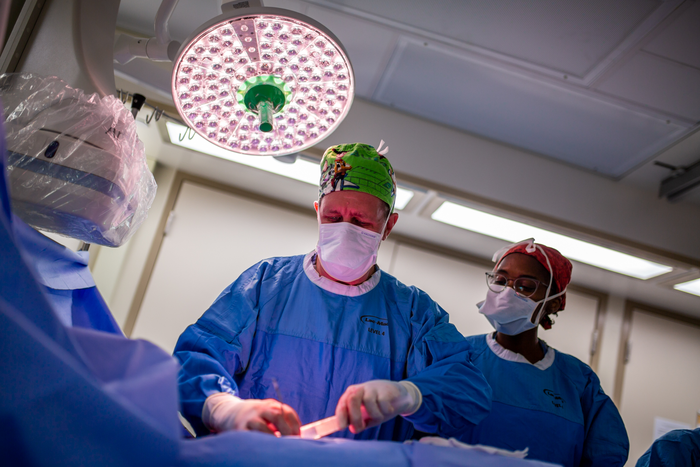Hamilton, ON (April 30, 2022) – High-risk patients who need defibrillators to prevent cardiac arrest can experience fewer complications with a type of device implanted under the skin, a Canadian study has found.

Credit: Owen Thomas, Hamilton Health Sciences.
Hamilton, ON (April 30, 2022) – High-risk patients who need defibrillators to prevent cardiac arrest can experience fewer complications with a type of device implanted under the skin, a Canadian study has found.
Traditional defibrillators, while highly effective, involve placing a wire through a vein, into the chest and into the heart itself. The wires, known as ‘leads,’ in the traditional defibrillator – called a tranvenous ICD (TV-ICD) – can cause complications including perforations in the heart muscle or lungs and blood clotting in veins.
A study, conducted by researchers at Population Health Research Institute (PHRI) has demonstrated that a new type of cardiac defibrillator called a subcutaneous ICD (S-ICD) reduced patient complications by more than 90 percent, compared to the TV-ICD.
The S-ICD, implanted under the skin just below the patient’s armpit, does not involve any placement of leads into the heart or blood vessels. Instead, the S-ICD has a lead that runs under the skin, alongside the breastbone.
“The S-ICD greatly reduces perioperative, lead-related complications without significantly compromising ICD performance,” says Jeff Healey, a senior scientist at PHRI, a research institute of McMaster University and Hamilton Health Sciences (HHS).
“The S-ICD is now an attractive alternative to the TV-ICD, particularly in patients at increased risk for lead-related complications,” adds Healey, a professor of cardiology at McMaster, and an electrophysiologist at HHS.
Healey presented the study’s results at Heart Rhythm 2022 in San Francisco, CA today.
The study involved 544 eligible patients (one-quarter females) with average age of 49, at 14 clinical centres in Canada.
They were electrocardiographically screened; 251 patients were randomized to S-ICD and 252 patients to TV-ICD. They were followed up for an average of 2.5 years to this point; follow-up is ongoing for the study.
Younger patients are usually under-represented in ICD trials,” says Healey. “However, our study included ICD-eligible patients 18 to 60 years old who had a cardiogenetic syndrome or were at high risk for lead-related complications.”
He added: “Canada has a strong history of ICD clinical trials and registries of patients with inherited heart rhythm disorders.”
Funding for the study was provided by Boston Scientific.
-30-
Editors: Pictures of Dr. Jeff Healey in the electrophysiology lab at HHS; and his portrait picture, may be downloaded from: https://bit.ly/3uYZfgt
Fore more information, please contact:
Dr. Jeff Healey
[email protected]
M: 905-330-6760
Veronica McGuire
Media Relations, Faculty of Health Sciences
McMaster University
M: 289-776-6952
Heather Angus-Lee
Communications
Population Health Research Institute (PHRI)
[email protected]
M: 905-308-0038
Wendy Stewart
Communications & Public Affairs
Hamilton Health Sciences
[email protected]
Method of Research
Randomized controlled/clinical trial
Subject of Research
People




